Any day now, a hundred Bangladeshi smallholder farmers will be planting their annual aubergine crop. But this year this select band will not be planting their usual seeds of the crop they call brinjal and many know as the eggplant.
These family farmers, chosen by the country’s agricultural researchers, will be growing a genetically modified (GM) variety. Bt brinjal has been developed by crop scientists in Bangladesh and neighbouring India to fight off insects that often halve yields and force farmers into daily spraying with dangerous pesticides. If all goes well, in a few months the harvest will be on sale in local markets across Bangladesh.
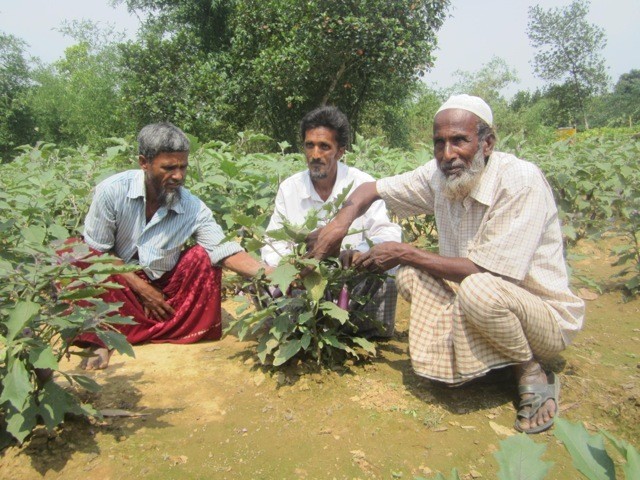 Genetically modified brinjal could improve food security for small holder farmers and reduce pressure on the natural environment. Photo: Mark Lynas/Cornell
Genetically modified brinjal could improve food security for small holder farmers and reduce pressure on the natural environment. Photo: Mark Lynas/CornellSome will be appalled. They will decry it as the latest manifestation of an alien technology taking over farming, wrecking the natural environment. But I suggest that, with World Food Day approaching, we should celebrate this new weapon in the war to help smallholders feed their families safely, and on limited land. Ecosystem services may be protected rather than squandered.
Frakenfood bust
This is not a Western technology imposed on unwilling farmers. It is actually a great example of crop scientists from the South harnessing GM technology for the benefit of small farmers and their families. By raising yields and cutting the use of pesticides by this most disadvantaged group, it will further the aims of the slogan adopted for this year’s World Food Day on the theme of family farming: “Feeding the world, caring for the earth.”
There are three reasons to fear GMs. They might, in a word coined by Greenpeace campaigners some years ago, create “Frankenfoods” that are dangerous for us all. They might contaminate wild relatives of the crops with rogue genes spliced into the crops. And they might further the domination of agribusiness over world food supplies and the lives of hundreds of millions of smallholder farmers.
Well, the fear of Frankenfoods looks like a busted flush. GM crops have been in the food chain in some places for a couple of decades now without obvious problems.
Genetic pollution, while certainly possible for some crops, hasn’t happened on any scale and – on the evidence of millennia of conventional plant breeding – seems unlikely. While South Asia is the genetic heartland of its wild relatives, those tested are sexually incompatible with Bt brinjal, say the scientists involved.
Agribusiness takeover?
For many, that is a much bigger and more immediate issue, especially with key GM technologies dominated by a handful of companies -- most notably, and most notoriously, Monsanto. But do we have to translate a fear of big bad agribusiness into a fear of GMs? Why, to put it another way, should the devil have all the best tunes? If our main problem with the technology is who owns it, then let’s liberate it for the common good.
That, I suggest, is what is going on in South Asia right now. Or will if some very angry and very influential anti-GM campaigners can be got out of the way.
Bt brinjal illustrates the issues well. Bt stands for Bacillus thruinglensis,a common soils bacterium. Bt brinjal has spliced into it a gene from the bacterium which produces a toxin that kills many insect pests, including the larvae of the fruit and shoot borer moth, the biggest threat to brinjal. It dramatically reduces the amount of pesticides that farmers need to use to fight the larvae, and so will increases their yields.
Yes, the technique is owned by Monsanto. And the company got a lot of stick for initially charging high prices for Bt cotton, when it was first introduced in India two decades ago to fight bollworm. But Monsanto doesn’t see any profits in a crop like brinjal. Though one of South Asia’s most popular vegetables, it is mostly grown by poor smallholders. So a decade ago, the company gave local scientists free use of the gene to put into brinjal and other local crops, such as chickpeas.
Now, Bt brinjal is on the verge of making it to market in Bangladesh. It could do the same in India if the new government of Narendra Modi lifts a moratorium on trials imposed by its predecessor back in 2010 after a virulent campaign by Greenpeace and other environmentalists.
A win for family farmers
Local scientists I spoke to while visiting the two countries recently insisted their aim was to help poor local farmers. That was why they had prioritised developing Bt brinjal over other crops. And that was why they had ensured that, unlike Monsanto’s Bt cotton, which is a hybrid, farmers will be able to propagate their own Bt brinjal seeds for the next crop.
They said they had a range of nine different GM brinjals in the pipeline, each with their own characteristics, because they want to maintain the variety of types currently available to farmers. They denied there would be any significant loss of agro-diversity. And they said that a combination of reduced pesticide spraying and the prospect of much higher yields could significantly reduce pressure on the natural environment in areas where brinjal is grown.
Now you might see Monsanto’s free licensing of their technology for brinjal as a Trojan Horse to get GMs into potentially big seed markets like India. You might be right. But surely it is also a chance to take a valuable new technology out of the hands of its rich owners and use it in the service of family farmers.
Depending on the view you take, you will be either appalled or delighted that local scientists have other GM crops under development that are specifically designed for smallholders. They include a Bt chickpeas, a drought-tolerant sorghum, and a potato resistant to late blight.
And of course there is golden rice, another GM crop developed by researchers using largely public funds and for the benefit of the poor. Enriched with Vitamin A to alleviate a widespread and lethal dietary deficiency in many countries, golden rice has been ready to come out of the lab for a decade now. But as yet, no country has taken the first step of licensing it. It is a failure that some believe is responsible for millions of deaths every year.
The fact is that in South Asia, publicly-funded local scientists are deciding what GM crops to develop and how the technology is deployed. Surely this is something that deserves support from those of us whose concerns about GM food crops are primarily about who controls the seeds? SR Rao, who helps manage GM trials at the Indian government’s Department of Biotechnology, told me: “I can’t let 100 million people go hungry if we can do a transformation in crop yields and nutrition with GMs.”
Opponents of GM crops invoke the precautionary principle. They say that no risk from such crops, however small, should be tolerated. But they apply this principle only to the environmental and food-safety fears that they have themselves stoked remorselessly. Why not set beside that the need to take a precautionary approach to preventing deaths from malnutrition? On World Food Day, that might give a different answer.



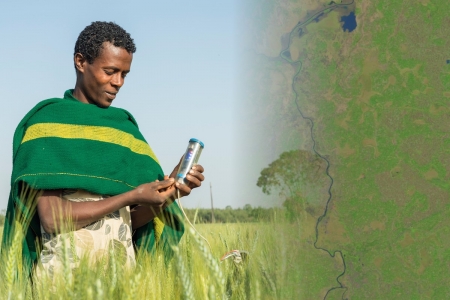


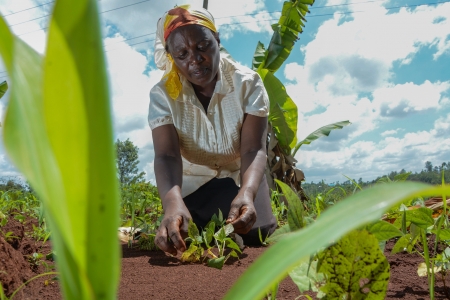










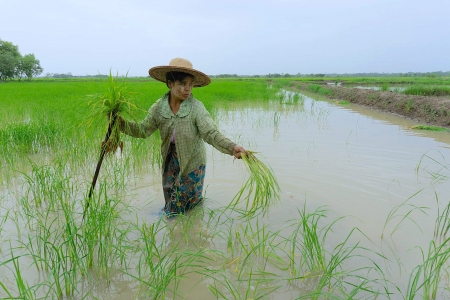


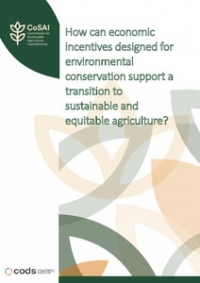
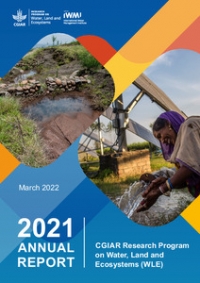

Comments
"Why not set beside that the need to take a precautionary approach to preventing deaths from malnutrition?" .... was the credo from USAID when they tried to force GM-maize into Zimbabwe a couple of years ago.
It is the credo for all GM-food praisers...
You forgot to mention that Mahyco, the Indian seed company who developed Bt Brinjal is 26% owned by Monsanto?
You also forgot to mention that Mahyco Mahyco became India’s first commercial entity to be accused of bio-piracy, or misappropriation, of local germplasm.
And the fact that Monsanto sees no profit in Brinjal makes me all the more suspicious.
Your post reads more like a pro-GMO rant, than a blogpost based on objective facts, which is what I would expect on a blog from a scientific research program.
Good luck with feeding 100 million hungry with eggplant.
John, Please look again at the points I make about public-sector researchers using the technology for public-spirited ends. And then perhaps consider whether it is you ro me who is ranting.
A balanced and well written piece Fred. The argument put forward for Bt brinjal is cogent and compelling. There are significant benefits that do accrue to the livelihoods of the most vulnerable and the environment. Any reduction in the use of pesticides has positive impacts on ecosystem services and human health. Making this technology available to farmers and ensuring that they are not dependent on commercial entities in perpetuity is to me a significant global public good.
I agree with your comments Andrew - we need to take an objective view case by case. Fred, could you collect data on how the project proceeds over say the next 3 years and compare to the outcomes anticipated above. Would appreciate a good news story if there is one in GM crops.
Thanks Tony, I will certainly be following events, both in Bangladesh and India. The verdict will come from the farmers.
In the United States, genetically engineered Bt corn has already produced insect immunity to Bt. So now what? Organic farmers, who have relied on external applications of Bt to control unusual insect infestations, and who warned of insects developing immunity to Bt, are now faced with the loss of one of the few organic insecticides.
Do you know of any studies done to test the reaction of the human gut to ingesting Bt over a human lifetime? How do the digestive systems of infants and small children react to Bt introduced into their bodies while they are developing fetuses?
What is the nutritional value of eggplant/brinjal, that it has been targeted by agribusiness as an indispensable, humanitarian, health promoting food crop?
Have non-industrial, non-chemical approaches to raising eggplant/brinjal, such as interplanting, fallowing fields, introducing natural, biologic predators or rotational planting been tried and found to be wanting?
What is the reason for this recent and devastating loss of crops to insects? Is this farming community a traditional site for growing eggplant/brinjal? How have they, or what have they done to control insect damage of eggplant/brinjal?
I think you are a public relations shill for agribusiness corporations. You've written a poorly explained account of what is occurring on the farms, and a wonderfully positive promotion piece for genetic engineering. Shame on you.
Jim,
I don't want to be pompous, but I do object to being called anybody's shill. I suspect my mind is rather more open to argument than yours. Nobody should suggest than GM technology will solve all agriculture's problems. But, to reiterate what I said in the piece, it is surely a mistake to condemn the technology because you don't like some of its practitioners.
Suggest readers have a look at the following in terms of golden rice. In addition, Sally Brooks has an excellent book entitled "Rice Biofortification: Lessons for Global Science and Development, which is well worth the read.
https://irri.org/blogs/golden-rice-blog/golden-rice-a-social-review
Finally, a reasonable article about genetically engineered plants helping farmers, consumers and the environment! As a publicly funded scientist whose goal is to develop safer pest management strategies, I congratulate Bangladesh for having the courage and foresight to adopt Bt eggplant. Rather than having to protect the eggplant by oftentimes daily applications of broad-spectrum insecticides, farmers in Bangladesh can now use plants that produce a protein from a common bacterium (Bt) that protects it from attack by the devastating eggplant fruit and shoot borer. And Bt is so safe that I routinely taste it when presenting lectures about it! I would never do that with any other type of insecticide, conventional or organic. Furthermore, because this Bt only affects some species of caterpillars, it does not harm pollinators and other beneficial insects. In fact, our research has shown that beneficial arthropods such as predators and parasites are not harmed by Bt so they actually help delay the development of "immunity" by pests to Bt plants. So, Bt plants protect the crop and help conserve biodiversity, a win-win situation. Most importantly, they also protect farmers and consumers from the well documented hazards of common insecticides that are routinely applied to produce eggplant in Bangladesh. Congratulations to Bangladesh for making a judgement based on scientific facts and adopting Bt eggplant.